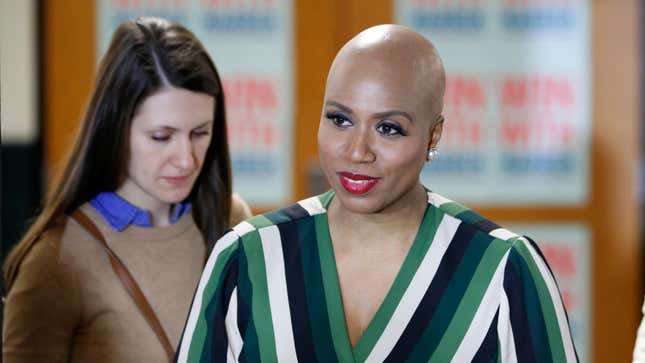
Massachusetts Congresswoman Ayanna Pressley penned an open letter to former Vice President Joe Biden on Tuesday calling for the presumptive presidential Democratic nominee to give a response that “models the empathy, diligence, and acknowledgment of broken systems that this conversation demands.”
Rep. Pressley’s letter, titled “It’s 2020 and We Still Don’t Know What Survivor Justice Looks Like,” stopped well short of calling for an investigation into the allegations launched against Biden by former staffer Tara Reade, who has accused Biden of sexually assaulting her in 1993, when she was an aide for the then-Delaware senator. But the letter was remarkable for how far it stands from many other prominent women in the Democratic Party who have unequivocally thrown their support behind Biden.
“I am not new to watching survivors bare their souls, and I am not new to being offered false choices in politics,” wrote Pressley. “I reject the false choice that my party and our nominee can’t address the allegations at hand and defeat the occupant of the White House.”
The congresswoman acknowledged her own experience as a survivor, something she has talked about often on the campaign trail and during her tenure in office (she had survived years of childhood sexual abuse). That experience has informed her understanding of what empathetic conversations and work around sexual abuse looks like:
For those involved in the struggle for survivors’ justice, most of the work doesn’t take place in public, it is late night phone calls when trauma wraps us in a chokehold, it is tearful conversations whispered in confidence. It is the slow and steady work of helping each other heal and rebuild.
But when the experience does play out in public — as it has with Joe Biden and Tara Reade — we are called to examine an urgent and visceral question: what does an authentic path towards healing and justice look like for survivors in America?
While the Biden campaign has denied the allegations since they first surfaced in March, Biden didn’t personally address Reade’s claims until May 1, first in a Medium post and then in a follow-up interview with Morning Joe’s Mika Brzezinski.
“She has a right to say whatever she wants to say,” Biden told Brzezinski. “But I have a right to say, ‘Look at the facts,’ and ‘it’s just not true.’”
Ever since the #MeToo movement rose to national prominence in October 2017, Democrats—and in particular, Democratic women officials—have championed it. Sen. Kirsten Gillibrand (D-N.Y.), notably, was one the first Democratic senators to call for Al Franken’s resignation. The former senator from Minnesota was accused of sexual misconduct by multiple women in 2017 and resigned in early 2018.
But many of the elected women who have positioned themselves as public advocates of sexual assault survivors have given their blessing to Biden, including Gillibrand. House Speaker Nancy Pelosi—the most powerful woman in the Democratic Party—was uncompromising in her support:
“I have complete respect for the whole #MeToo movement,” Pelosi said April 30, the same day she gave Biden her endorsement for president. “There’s also due process and the fact that Joe Biden is Joe Biden.”
Sen. Elizabeth Warren (D-Mass.) offered a more tempered response this week. The progressive senator is considered one of the top choices to be Biden’s running mate.
“I saw the reports of what Ms. Reade said, I saw an interview with Vice President Biden,” Warren told CNN’s Manu Raju. “I appreciate that the vice president took a lot of questions, tough questions. And he answered them directly and respectfully. The vice president’s answers were credible and convincing.”
Pressley’s letter is more similar in tone and tenor to #MeToo founder Tarana Burke’s Biden comments, which refused to give easy answers or side wholly with any one person’s account.
“[Biden] could demonstrate what it looks like to be both accountable and electable,” Burke wrote in a Twitter thread last week.
Pressley put little stock in the sincerity of the Republican lawmakers pressing for an investigation into Reade’s claims, noting that many of them voted against the former veep’s Violence Against Women Act, a landmark piece of legislation Biden helped usher into law. She also cited their conduct during the confirmation hearings of Supreme Court Justice Brett Kavanaugh, and their political weaponizing of the Biden assault claims to undermine the election campaigns of Democratic women in purple states.
“What they care about is using anything they can to undermine the Democratic nominee,” Pressley said. “It is a shameless and brutal exercise that does nothing but irrevocably harm the very people such opportunists claim to be standing up for.”
The solutions that Pressley offers, though, aren’t prescriptive and leave plenty of room for interpretation. She asked for the Biden campaign to offer a more empathic response that acknowledges the fraught system survivors have to navigate just to be heard. She also called for policy commitments “ that get us closer as a nation to reconciling our history of structural violence and oppression.” The progressive lawmaker suggested that Biden might begin this process by listening more purposefully and intently to the needs of survivors.
“Survivors and marginalized people from all walks of life are watching, wondering if—this time—the conversation might actually change,” said Pressley. “There are survivors in every corner of this nation who can tell you what a more just America would look like. I, for one, will be listening.”



